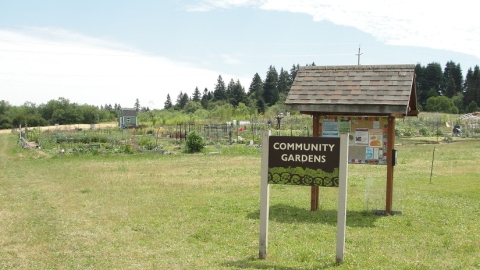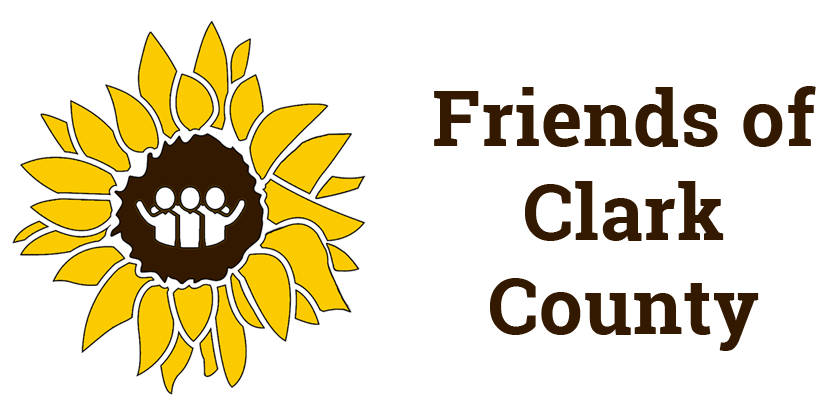Heritage Farm Sustainability Plan: Reconsider in Light of Climate Change and the Public Good
Heritage Farm is a 79-acre historic poor farm owned by Clark County and located just off of 78th Street in Hazel Dell. It is the site of many wonderful agricultural projects, mostly run by WSU Clark County Extension, including programs for agricultural research and education, food preservation, and health and wellness. In addition, rental garden plots are available at Heritage Farm, and it is the site of the Master Gardener Foundation Organic Fields, as well as the 4-H Restorative Community Service Food Bank Garden for at-risk youth. On top of this, the 10-acre Clark County Food Bank plot at Heritage Farm produces over 70,000 pounds of vegetables for the food bank each year that feeds our community. Their Farming and Gleaning program emphasizes its mission to localize the source of our emergency food supply.
Heritage Farm’s 2020 Master Plan envisions that all activities on the farm will “celebrate the community, reflect the area’s history, and provide a healthy and sustainable environment for future generations.”

Image from the Heritage Farm Public Works webpage
What is the Sustainability Plan?
When you think of sustainability in the context of farms, you might be thinking about closed-loop, regenerative farming practices that are considered environmentally sustainable. However, the Heritage Farm Sustainability Plan was developed at the direction of the Clark County Council to ensure financial sustainability of Heritage Farm operations so that it would generate more revenue for itself rather than draw from the General Fund, as it is owned by Clark County. Direction was also given to staff to expand public access, and a Steering Committee for creating this plan was formed.
The Steering Committee and public meeting process for the Heritage Farm Sustainability Plan culminated in the development of three alternatives for how to address finances and public access at Heritage Farm:
- Alternative 1( Enhanced Farm): opts to continue to operate in the same manner, but is not preferred by staff because they believe it falls short of meeting the financial and public access goals the plan was created for;
- Alternative 2 (NGO): would create a Request for Proposal (RFP) selection of a third party, such as a Non-Governmental Organization (NGO), to operate the farm, but is not preferred because of the challenges of finding an NGO with the capacity for the operation and ensuring they meet the Heritage Farm Master Plan guiding principles;
- Alternative 3 (Agri-Park) PREFERRED: would be a combination of multiple earlier alternatives, with the most notable changes including transferring it to the Parks Department and operating the farm with fully open public access facilities more like a metropolitan district community park with trails. This option notes that recreation and farming activities would be kept separate and would attempt to establish security of the farming projects.
FOCC Supports Alternative 1: Enhanced Farm
We appreciate the Heritage Farm Sustainability Plan Steering Committee’s hard work in threading this difficult needle to create a plan that will continue to fulfill the mission and purpose of Heritage Farm, while also improving the farm’s generation of revenue and expanding public access as directed by the 2020 iteration of the Clark County Council.
We are most relieved to find that the Sustainability Plan that the county selected will not recommend selling the property, removing agricultural practices at the site, or eliminating Washington State University Extension services. We commend the Steering Committee for establishing hard lines against options that would greatly conflict with the mission and purpose outlined in the Heritage Farm Master Plan.
However, we disagree with staff’s plan to move forward with Alternative 3 (Agri-Park). Alternative 1 (Enhanced Farm), as presented by the Steering Committee, is preferred by FOCC with the following emphasis: that the county pursues a conservation easement on the property so that it will forever be retained for its mission and purpose; that public access be limited to special events, tours, education events, and open houses; that no redesignation or other action be taken that hinders the ability of those special events to take place; and that change be limited to enhancements and improvements only as necessary.
Heritage Farm Provides So Much Public Good
We believe it was on a false premise that the Heritage Farm had to create a financial Sustainability Plan. There was an incorrect belief by certain council members that Heritage Farm took several hundreds of thousands of dollars from the General Fund every year, while it only costs $170,000 per year, which is a minimal expenditure when compared to the benefits it currently provides the community.
Friends of Clark County also emphasizes the importance of localizing and expanding our emergency food supply to prepare for the frequency and intensity of severe climate events impacting our food systems here and around the world as a result of global heating. In this regard, Heritage Farm, as is the case with all food-producing farmland in our local communities, is undervalued as a community resource, and we believe its value should be reconsidered in light of the reality of our warming planet.
Security Concerns with the Preferred Alternative (Agri-Park)
With local food production being more important than ever, we believe there are legitimate concerns regarding security at Heritage Farm if it were to be open to the public as an agri-park. Existing and future agricultural projects need to be protected, and their integrity could be jeopardized by just one bad actor. It is difficult to envision how an interpretive trail around the property could be controlled or supervised adequately in a way that doesn’t increase the financial burden this plan was created to reduce. We believe this reduced security of the farm could conflict with the 2020 Master Plan’s vision to provide a healthy, sustainable environment for future generations, as well as its agricultural and education purposes if these projects were open to tampering.
Furthermore, there is currently enough opportunity for public access, as all are welcome to participate in the community gardening, farming, and educational programs that already exist, but activities at the farm could be better publicized to increase participation, which would fulfill the goal of increasing public access. This viewpoint is consistent with the themes that emerged from community leaders and the community survey as part of this planning process.
Heritage Farm Is a Treasure that Should Be Protected
To reiterate, FOCC believes the urgent need to scale up for climate resilience paired with security concerns warrants a reconsideration of this precious public asset. We ask that Clark County redirect this plan towards Alternative 1 (Enhanced Farm), rather than Alternative 3 (Agri-Park), while also moving forward with placing a conservation easement on the property. This option would best fulfill the vision of the 2020 Master Plan. Those who have loved, appreciated, and worried for years about the fate of this farm, with its rich history and immense value, would like to settle the question of whether Heritage Farm could be altered or eliminated by decision makers in the future.
Again, our viewpoint is consistent with the themes gleaned from community feedback as part of this planning process, which voiced that the farm is a unique resource, that the preferred future for the farm is largely to expand current uses, that anxiety exists regarding the future of the property, and that this public asset does not need to be entirely self-sustaining given the public good it provides us all.
